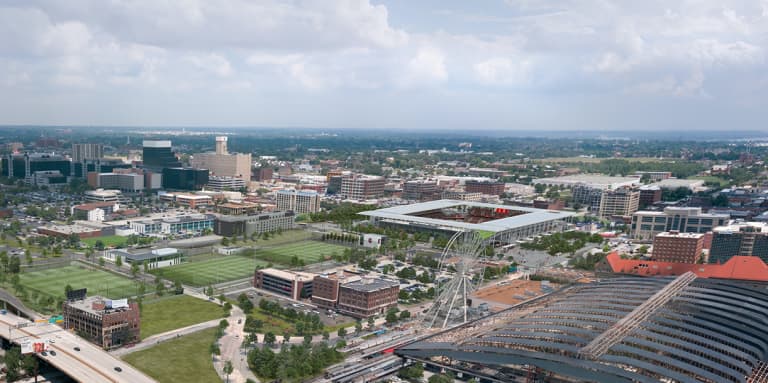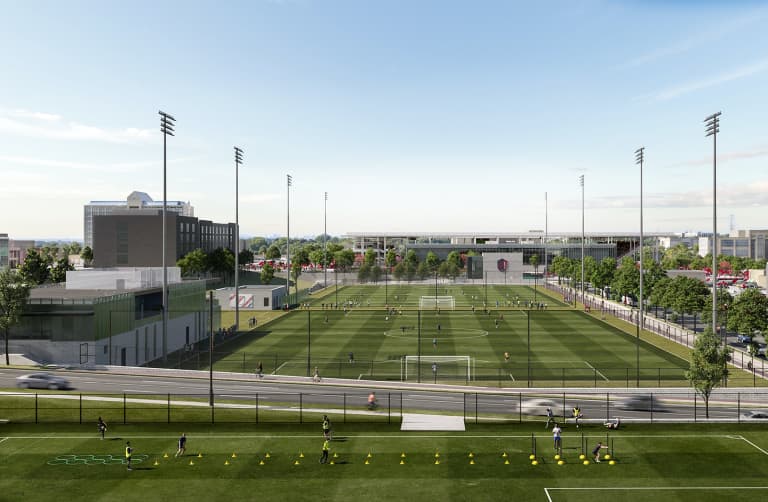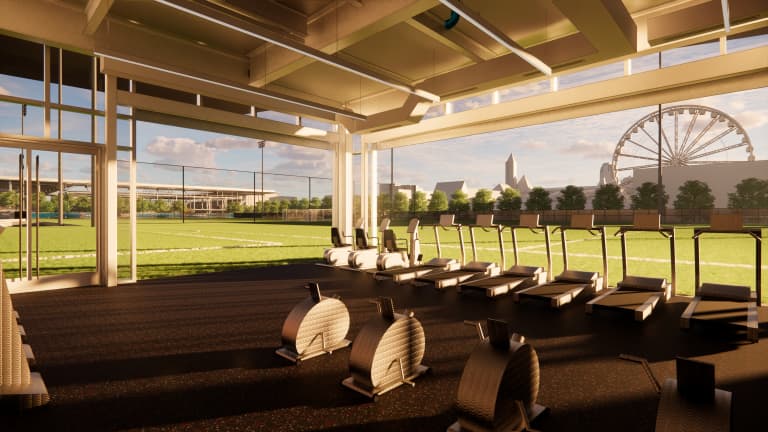Most MLS teams have faced a knotty dilemma over the league’s 21st-century construction boom: Downtown or suburbs? The question mostly applies to stadium locations, and given the cost and paucity of urban real estate, even those able to carve out a spot in the city have typically had to set up the larger footprints of their training facilities further afield.
The picture looks dramatically different for St. Louis CITY SC – exceptionally so.
“For me, it’s one of the most interesting and exciting projects in international football,” sporting director Lutz Pfannenstiel told reporters in a Thursday video call, “having the opportunity to grow the club from scratch, to really be able to help to shape the experience.”
The expansion side are well into construction on their future stadium in the Downtown West district, located a stone’s throw from Union Station, the city’s former train hub turned mixed-use renovation project. It figures to be a gorgeous soccer-centric venue, with a full roof, public spaces for year-round use and an open, 365-degree design with “no back doors,” in the words of one of the project’s leaders.

Overview of St. Louis City SC downtown campus | Courtesy of St. Louis City SC
But what really separates it from the rest is across the street. Market Street, to be specific, the thoroughfare that starts under the shadow of the famous Gateway Arch on the Mississippi riverfront and runs west past City Hall, the Enterprise Center and other landmarks of a proud downtown civic leaders are eager to keep revitalizing with the arrival of MLS.
CITY SC will house their entire operation – training facility, youth academy, club offices, team shop, “fan pavilion,” cafe and more – on site, reclaiming blocks of land that were once a wasteland of surface parking lots and sprawling concrete access ramps for nearby Interstate 64. A tunnel is even being laid underneath Market Street to better connect the two sides and allow “back-of-house” services to be detached from the stadium’s footprint.
“I think we wanted to make a clear message in sending it out there: Everybody is under one roof, everybody is the same club, everybody is one facility. This is not very common,” noted Pfannenstiel. “This is normally where you do have that kind of separation, because you’re trying to keep a certain peace and quiet space in a facility, so there's not too many people at the same place at the same time.”
While parts of the training ground will be kept private for players and staff, the project’s overarching theme is connectedness to the wider community, with the hopes of anchoring a renaissance in a scruffy area too easily consigned to the city’s periphery in recent decades. And it’s not all new construction: During Thursday’s construction update City SC announced that they have acquired Union Square Plaza, an old railroad building adjacent to the plot where four training pitches will eventually sit, to become the base for about 150 front-office employees.

Northward view of St. Louis City SC training facility, stadium in background | Courtesy of St. Louis City SC
It’s not so much a stadium as a “campus,” and its design already reflects the fledgling organization’s desired identity.
“We really believe [the project] amps up the energy and excitement of the downtown West District on matchday and every day,” said Matt Sebek, the club’s chief experience officer, who confirmed that the full undertaking is on schedule for a summer 2022 completion, leaving ample time ahead of St. Louis’ MLS debut the following spring.
The work was already well underway when Pfannenstiel took up his post. But the charismatic German wasted no time in influencing the design of the training center in particular, right down to the shape of the first team’s locker room – in the spirit of egalitarianism, it’s oval, like those found at Manchester City and elsewhere – and the placement of the washing machines that will launder the various teams’ gear.
“It shouldn't go unnoticed that we had the building in a different spot before Lutz came on board,” said Emily Louchart, a principal designer with architecture firm HOK. “And we stepped back to really analyze the best location for this building, how the pavilion and the fields really want to be oriented. So really taking that holistic view from the get-go to do that was part of that.”

Rendering of St. Louis City Training Facility's workout area | Courtesy of St. Louis City SC
A well-traveled character with a broad contacts network across his native Germany and beyond, Pfannenstiel visited other clubs to pluck ideas – “it was a bit like a candy shop,” he joked – and used his prior experiences as a player and scout to shape his and City SC’s vision for their future. And the academy sits at the heart of that – so the youth teams are being centrally incorporated in turn.
“I think it’s very important to have the opportunity to actually put the first-team players and put the academy players together. They need a space where they also have the separation, but of course, also space when they do mingle together,” he said. So the kitchen was placed at the heart of the building, where the club’s present and future players can interact over meals that are tuned for peak performance.
“That is very much a European influence from one club we visited,” Pfannenstiel explained, “where we took advantage of that rubbing shoulders, and that connection between the youth and the pros is something we really want to focus on and enhance. Because we want to focus on bringing young talents from our academy into the first team, and this is the best way.”
The layout of the academy facilities also matches the ideal player pathway.
“It's the donkey-and-the-carrot principle,” said Pfannenstiel. “Our youth setup, from the under-14s up to the older age groups, they move every year closer towards the first-team facility where in the end, they're literally looking through a glass door into a facility of the first team. So you're getting every year when you approach the next age group, you get closer to your dream.
“I think we found the perfect way to to separate certain things so that everybody can still focus on the job, but to always give the young players the impression to be close to the pros, to literally be able to touch them and see how they work, what to do,” he added, noting that the same spirit of cooperation guided the coaches’ quarters.
“We will work with all the coaches in the offices, the exchange of coaching ideas between the youth and the pros, our coaching philosophy will go from the under-14 level up to the pro level. So everything will be very much unified, and it will be a completely different approach than most MLS teams.”













